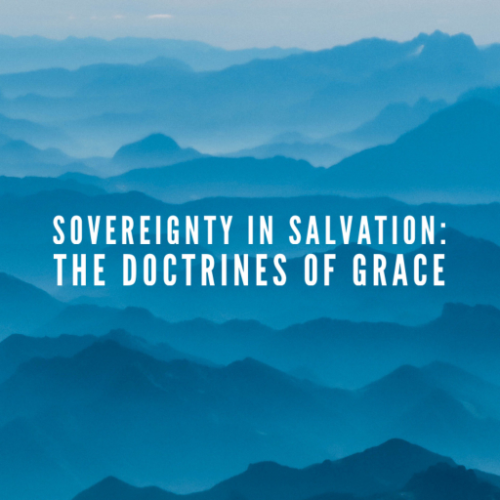
- Written by Steven Amis
Ask anyone who does not adhere to reformed theology what comes to mind when they hear the term “Calvinism”, and more often than not they will respond with, “predestination”. Predestination is certainly a vital component of the doctrines of grace, and as we began to touch on last week, it is part of God’s eternal decree. But what is it about the term predestination that causes so much dissonance among believers, and even among those within reformed circles? Why is this aspect of God’s sovereign will a cause for so much confusion, and why is it often the butt of anti-Calvinist jokes and pickup lines (i.e. “God predestined me to not be a Calvinist”)?
- Written by Steven Amis
It has been several years now since our church went through John Snyder’s “Behold Your God” series, but I still remember the study like it was yesterday. I remember studying the weightiness of God’s divine attributes and how perfect, beautiful, majestic, and inseparable they are. We considered and meditated on Scriptural truths concerning God’s holiness, eternality, immutability, wrath, righteousness, love, grace, patience, and so on. We discussed how God not only demonstrates each of these attributes perfectly and harmoniously, but that these attributes are essential to His character and nature. For example, God not only shows His love, He is love (as 1 John 4:8 puts it), meaning that God is the ultimate embodiment of love and it is a core aspect of who He is. The same can be said of all His other attributes. God does not just hold to a perfect standard of righteousness -- He is the standard of righteousness. As we continue to gaze upon this perfect diamond and look at it from different angles, let’s think about God’s eternality, immutability, love, and grace, because these are at the very heart of what the eternal decree of God is all about. This is a decree that God had made to demonstrate His love and grace by redeeming those whom He elected in eternity past.
What does Scripture have to say about God’s plan of redemption in eternity? Perhaps no text comes to mind as readily as the amazing words Paul penned in Ephesians 1. Here, we find a treatise of the Triune God’s plan and involvement with our election, redemption, and eternal security. The Father elects and predestines our salvation (v. 4-6, 8-12), the Son provides the atoning work as His act of redemption (v. 7-8), and the Spirit seals us and is our surety for our ultimate inheritance as adopted sons and daughters of the Father (v. 13-14). We find that all that is involved in our salvation is “according to the kind intention of His will” (v. 5) and “according to His purpose who works all things after the counsel of His will” (v. 11). In other words, everything that takes place in our salvation is the result of God’s eternal decree.
For all of eternity, the Persons of the Godhead have enjoyed perfect fellowship, joy, love, and harmony with one another. Each member of the Trinity has distinct roles, but the Persons are one in essence, meaning that the Father, Son, and Holy Spirit have the same will and intention. Therefore, we can deduce that whom the Father predestined for adoption, the Son provided the redemption for through His blood and for whom the Spirit provided the guarantee of the inheritance. God’s eternal decree is consistent within Himself, because it is in His very nature to be consistent, for He says, “I, the Lord, do not change” (Malachi 3:6). Since God planned our salvation in eternity and His sovereign will cannot be thwarted (Job 42:2), our election is indeed unconditional, hence why this doctrine of grace is commonly referred to as unconditional election.
It is truly a marvelous thing to consider that God is perfectly content within Himself, and therefore did not need to create anything, let alone a humanity that would rebel against Him. Yet it is entirely out of His love and good pleasure that He did create us so that He would lavish His love and grace on those of us whom He elected. To what end? Jesus answers this question in His high priestly prayer in John 17 when He said, “…that they may know You, the only true God, and Jesus Christ whom You have sent” (v. 3). Before we were born, God knew us, and He purposed in His eternal decree to create us so that we would know Him! In the present age, we know our Lord through the means of grace that He has provided to us: prayer, the Scriptures, the ordinances of baptism and the Lord’s Supper, etc., but the time is coming when we will no longer be looking in a mirror dimly, but we will see Him face to face (1 Corinthians 13:12)!
The Bible is clear that God decreed our election in eternity past, so why then do many believers, including many evangelicals, deny, or at the very least downplay, the importance of God’s unconditional election? If you study all of the non-reformed positions on election, including Arminianism, Molinism, Semi-Pelagianism, Pelagianism, Open Theism, and so on, you will find that all of them have one thing in common: they all presuppose that man has an autonomous will and therefore inherently has the ability to choose salvation. It is in our fallen human nature for us to be informed and guided by our emotions and experiences rather than on the truth of God’s Word. Our flesh is naturally repulsed by the idea that our salvation is completely of the Lord, because after all, “I prayed the sinner’s prayer!” or “I walked down the aisle and made a decision to follow Jesus!” I have no doubt that you had such experiences. The issue though is that apart from the regenerating work of the Holy Spirit, you are enslaved to your sin and dead in your sin, lost in your depravity, and therefore incapable of ever choosing to follow Jesus on your own initiative.
Another common objection to the doctrine of unconditional election is the issue of fairness. Many evangelicals, including myself back in my Arminian days, object to the notion by arguing that it is unfair that God intentionally elected only some people and not others. There are two main problems with this objection; first, it is casting the blame on God for being unjust in His sovereign choice, which is ridiculous since righteousness and justice are the foundation of His throne (Psalm 89:14). Secondly, God elects us not on the basis of “fairness”, but solely out of His love and grace. The question we should be asking ourselves is not, “Why did God choose some but not others?”, but “Why did God choose anyone at all?” As the apostle Paul wrote:
“What shall we say then? There is no injustice with God, is there? May it never be! For He says to Moses, ‘I will have mercy on whom I have mercy, and I will have compassion on whom I have compassion.’ So then it does not depend on the man who wills or the man who runs, but on God who has mercy. For the Scripture says to Pharaoh, ‘For this very purpose I raised you up, to demonstrate My power in you, and that My name might be proclaimed throughout the whole earth.’ So then He has mercy on whom He desires, and He hardens whom He desires. You will say to me then, ‘Why does He still find fault? For who resists His will?’ On the contrary, who are you, O man, who answers back to God? The thing molded will not say to the molder, ‘Why did you make me like this,’ will it?” (Romans 9:14-20).
Are you beginning to see the bigger picture of election according to God’s eternal decree? Once you see it in one text of Scripture, you begin to see it everywhere in the Old Testament as well as the New Testament. Next time, we will focus a bit more on God’s work of predestination as the Bible describes it.
- Written by Steven Amis
The Christian faith is full of many wonderful doctrines that encapsulate what Scripture teaches us concerning who God is, who we are, why we are here, God’s plan of redemption, and where we are going when we die. Consider the doctrine of justification. We know from history that justification by faith was the battle cry of the Protestant reformation in the 16th century. It was a doctrine that the Roman Catholic Church detested so much that they declared it to be a damnable heresy at the Council of Trent in 1547. As fiercely decried as justification has been through the centuries, perhaps no doctrine taught in all of Scripture has been hotly debated as much as the doctrine of election. It is a controversial subject of theology not just between Protestants and Catholics, but is something that really hits home, as election is contentious even between evangelicals.
The doctrine of election is undeniably taught in Scripture, and the Spirit-inspired writers were very clear about God’s electing purposes in our salvation. So why do we see so much division in the visible body of Christ over something that is meant to be beautiful, glorious, and a great source of comfort for the Christian? To answer this question, we need to take a step back and explore what election is according to the Bible. Quite simply, to be elect is to be chosen by God. Jesus said, “You did not choose Me but I chose you, and appointed you that you would go and bear fruit…” (John 15:16). One of the more well-known passages concerning election can be found in Paul’s letter to the Ephesians where the apostle wrote, “…He chose us in Him before the foundation of the world…” (Ephesians 1:4). Election entails God choosing us for salvation in eternity past.
Most evangelicals would not have a problem with saying that they were chosen by God. But here is where the rubber meets the road when it comes to understanding this doctrine: God did not choose us on the basis of our love for Him, or some decision or profession of faith that we made. He chose us solely on the basis of His love for us, in spite of our rebellion and enmity towards Him. Romans 9 is undoubtedly the clearest text that teaches us this truth about election. There, the apostle Paul recounts God’s electing purposes during the time of the patriarchs, and wrote these amazing words:
“For this is the word of promise: ‘At this time I will come, and Sarah shall have a son.’ And not only this, but there was Rebekah also, when she had conceived twins by one man, our father Isaac; for though the twins were not yet born and had not done anything good or bad, so that God’s purpose according to His choice would stand, not because of works but because of Him who calls, it was said to her, ‘The older will serve the younger.’ Just as it is written, ‘Jacob I loved, but Esau I hated’” (Romans 9:9-13).
There have been many objections to what this text plainly teaches, but if we approach this passage with the most basic historical-grammatical hermeneutic, we can clearly see of what the apostle is informing us. God did not choose Jacob on the basis of anything he did. In fact, the choice was already made before he and Esau were even born! When we read the account of how Jacob used trickery to steal the blessing from Esau in Genesis 27, it is all too commonplace for us to evaluate Jacob in hindsight and conclude that he was actually a pretty awful guy. Esau was no better, and we read in Genesis 25 and 27 how he despised his birthright and was willing to trade that for food, and how he was a begrudging man after Isaac gave Jacob the blessing. These men were twins both physically and spiritually: both were equally depraved, and it is truly a wonderous thing that God would choose either of them at all. But this is precisely the whole point of election: God loves us in spite of our sin because it is according to His foreknowledge of us.
Foreknowledge is commonly misunderstood among evangelicals, and is perhaps the source of contention whenever the doctrine of election is discussed. But it is key to rightly understanding the true meaning of election. According to Romans 8:29-31, God has chosen us and predestined us to be conformed to the image of His Son because He foreknew us. What does it mean that God foreknew us? Our dear Pastor Johnson preached a sermon on Romans 8 back in 2020, and explained that the word foreknowledge can have three distinct senses: to know beforehand, to know beforehand by decree, and to know by love in eternity. Many evangelicals, when they come across a text like Romans 8 and they see the word foreknowledge, they are quick to think about that word in the first two senses. They would even make the case that foreknowledge is about God looking through the corridors of time and seeing in advance who would make a decision to follow Christ.
There are several issues we run into when we interpret the word foreknowledge from Romans 8 in that way. First of all, it forces God to be dependent on something that we do. This contradicts the omnipotence and sovereignty of God. Secondly, it implies that God chooses us on the basis of some inherently righteous thing that we do, which is problematic considering that our sin nature renders us totally depraved and unable to do any righteous deeds. Scripture teaches us something quite different: God did not choose us on the basis of what we do, but on the basis of what Christ did because of His great love for us. Finally, it devalues the personal relationship that God has with His chosen people. It makes God out to be a supercomputer that contains a database of information about every person and what decisions they make. But this is not the God of the Bible! God is not some impersonal cosmic supercomputer; He is our omniscient Creator who knitted each of us together in our mother’s womb. He created us to be in a relationship with Him, to know Him, to love Him, to fear Him, and to desire Him with every fiber of our being.
This leads us to that third sense of the word foreknowledge in Romans 8. While knowledge can refer to acquired information about something or someone, knowledge has other meanings in Scripture as well. It can refer to sexual intimacy, as we see in passages like Genesis 4:1 which in some translations reads, “Adam knew his wife Eve”. Physical intimacy in the covenant of marriage is only a picture of an infinitely deeper intimacy that Christ has with His church, and it is precisely this kind of knowledge that the meaning of foreknowledge in Romans 8 is really getting at. Just as there is a difference between knowing about someone and knowing someone in a deep, personal way, God did not merely choose us out of His knowledge of information about us; He chose those whom He knew in the most intimate way in eternity past! Think about that. Long before your parents came together and conceived you, God knew you, and had preordained when you would be born, when you would hear the gospel proclaimed, when you would respond with true saving faith and be justified in the sight of God, how your process of sanctification would play out, and when you will one day receive your glorification. This is only a basic overview of God’s eternal decree, but next time we will take a closer look at what Scripture teaches concerning how God predetermined your salvation in eternity.

